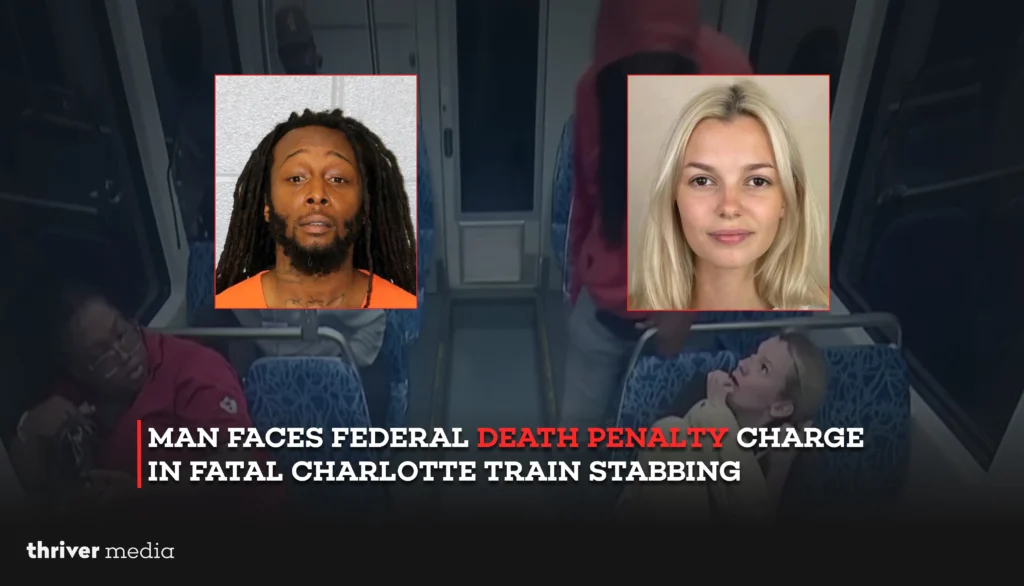Federal prosecutors have charged 34-year-old Decarlos Brown with a crime that could bring the death penalty for the fatal Charlotte train stabbing of 23-year-old Ukrainian refugee Iryna Zarutska on a light-rail train in Charlotte, North Carolina. The case has rapidly become a focal point in the national political debate over crime in American cities.
The U.S. Justice Department announced the charge on Tuesday: committing an act causing death on a mass transportation system. Brown is also facing a separate state charge of first-degree murder.

Details of the Attack and Criminal Charges
The unprovoked attack occurred last month inside a Charlotte Area Transit System light-rail car. According to an affidavit, Brown allegedly used a pocketknife to stab Zarutska. The weapon was later found near a train platform.
U.S. Attorney Russ Ferguson for the Western District of North Carolina stated that the investigation is ongoing and additional charges are possible. Officials have pledged to seek the maximum punishment.
“He will never again see the light of day as a free man,” said Attorney General Pam Bondi, promising to seek either life in prison or the death penalty.
Victim’s Story: Iryna Zarutska Sought Safety in the U.S.
Iryna Zarutska was returning from work on the train she commonly used when she was attacked. She recently moved to the U.S. with her partner after fleeing the war in Ukraine, where her family lived in a bomb shelter.
A graduate with a degree in art and restoration from Kyiv, Zarutska hoped to build a new life in America and become a veterinary assistant. Her family stated they are “heartbroken beyond words” that she found violence instead of peace.
U.S. Attorney Ferguson said the Ukrainian Embassy offered to repatriate Zarutska’s body, but her family declined. They said the United States was her home and final resting place.
Political Firestorm Erupts Over Case
Top Republican officials prominently cite the case as evidence of failed criminal justice policies in Democratic-led cities.
After the charges, Deputy Attorney General Todd Blanche called the murder “a stark example of failing liberal policies.” He criticized Charlotte officials for laws that let Brown remain free despite his record. He warned local leaders, “If you can’t keep your city safe, we will.”
President Donald Trump called Brown an “ANIMAL” on his social media platform and demanded a quick trial resulting in the death penalty.
Scrutiny on Defendant’s Criminal and Mental Health History
Calls for Judge’s Removal After Prior Release
The case has triggered scrutiny of the justice system itself. North Carolina Republican lawmakers are calling for the removal of Magistrate Judge Teresa Stokes, who presided over a previous case involving Brown.
Earlier this year, police charged Brown with misdemeanor misuse of 911 after he reportedly told them a “man-made” substance controlled him. Court documents signed by Judge Stokes released Brown on a written promise to appear for his next hearing. Republicans argue this decision showed poor judgment given Brown’s history.
A Lengthy Rap Sheet and Mental Health Struggles
Decarlos Brown has a lengthy criminal record dating back to 2011, with convictions including armed robbery and felony larceny. He served over five years in prison for robbery with a dangerous weapon before his release in 2020.
According to family members, Brown has a history of mental health struggles, and his sister believes he was having a breakdown on the night of the attack. Legal experts note the case highlights systemic challenges.
“The unseen failure is the dismantling of community mental health care,” said former district attorney Matthew Mangino. “Unfortunately, for some former offenders, the only place they receive mental health care is in jail or prison.”
Official Rejection of Case as Political Grandstanding
Despite the political rhetoric, law enforcement officials directly involved in the case have pushed back against framing it as a political issue.
U.S. Attorney Ferguson, after speaking with Zarutska’s family, became emotional and stated, “This is not about political grandstanding… There’s no politics of this. This is a pure and simple federal case.” He challenged the notion that there is an “opposite side” to prosecuting a violent crime.
Despite the intense criticism, Charlotte Mayor Vi Lyles is projected to win the Democratic primary as she seeks a fifth term.
The Judicial Decision That Sparked Outrage
The case took a dramatic political turn when public records revealed that Judge Christina DiMirco of the Broward County Circuit Court had presided over a previous, unrelated case involving Yevhen Vasylchenko.
Just weeks before Zarutska’s disappearance, Vasylchenko had been in Judge DiMirco’s courtroom on charges of aggravated assault with a deadly weapon. Prosecutors argued to hold him without bond, saying he posed a danger to the community. Judge DiMirco instead granted a pre-trial release under supervision.
This decision has become the focal point of intense criticism from the GOP.
The Republican Response and Calls for Action
Leading Florida Republicans, including state legislators and the GOP chair, launched a campaign to remove Judge DiMirco. They say her decision to release Vasylchenko was a failure of judgment that led to a preventable tragedy.
The party has announced a two-pronged approach:
- Formal Complaint: Filing a judicial misconduct complaint with the Florida Judicial Qualifications Commission, the body responsible for investigating judges.
- Political Pressure: Mobilizing public support to vote against Judge DiMirco in the upcoming judicial retention election, urging voters to “remove her from the bench.”
Their central argument is that the judge ignored clear warning signs about the defendant’s alleged violent nature, prioritizing a lenient bail policy over public safety.
The Broader Debate: Bail Reform and Judicial Discretion
This case has ignited a fierce debate that extends far beyond Florida, touching on one of the most contentious issues in the American justice system: bail reform.
- The GOP Position: Conservatives argue this case is a prime example of “catch-and-release” policies that endanger communities. They advocate for laws that give judges less discretion to release individuals accused of violent crimes.
- The Legal Defense Perspective: Criminal defense attorneys and judicial advocates caution against a rush to judgment. They emphasize that at the time of the prior ruling, Vasylchenko was presumed innocent of the assault charge. Judges must weigh the constitutional right to reasonable bail against the perceived risk. They argue that blaming a judge with hindsight for a subsequent, unrelated crime sets a dangerous precedent.
A spokesperson for the Broward County Chief Judge’s office declined to comment on the specific case but reiterated that “judges make decisions based on the facts and arguments presented to them in court at that time, following Florida law.”
What Happens Next?
The situation remains fluid with several ongoing processes:
- Criminal Case: The murder investigation against Yevhen Vasylchenko continues.
- Judicial Complaint: The Florida Judicial Qualifications Commission will review the GOP’s complaint to determine if an investigation into Judge DiMirco’s conduct is warranted.
- Political Battle: The call for Judge DiMirco’s removal will likely become a key issue in the upcoming election cycle, symbolizing the larger political fight over crime and judicial philosophy.
The tragic death of Iryna Zarutska has become a flashpoint, forcing a difficult conversation about the balance between individual rights and public safety in the American legal system.
Disclaimer: This article is based on public reports and ongoing legal proceedings. The accused is presumed innocent until proven guilty in a court of law. The views expressed by officials are presented for context and do not constitute editorial opinion.
Don’t miss a story that matters. Subscribe for updates.





